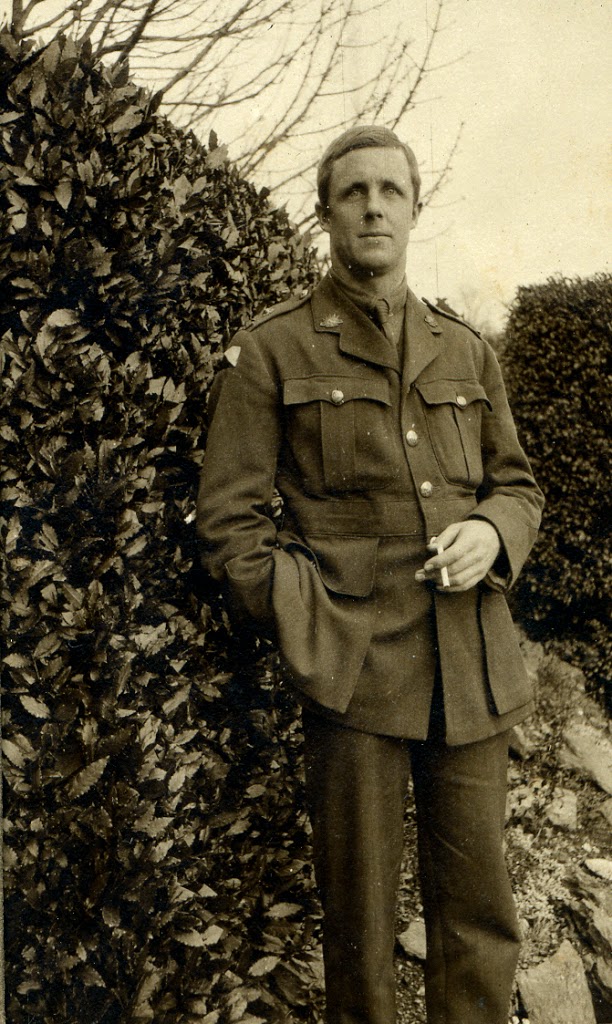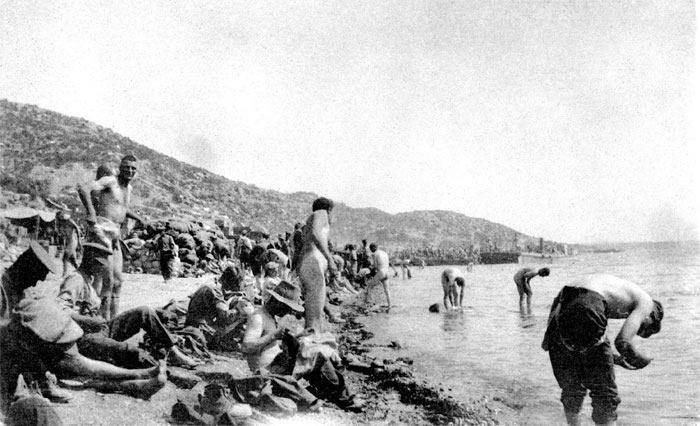Frank Anderson's 1915 Gallipoli diary continues recounting his experiences as part of the 10th Light Horse Regiment fighting in the Dardanelles.
Sunday, 8th August - "All day in the firing line, with no prospect of being relieved. We have practically no men here now, all being on our left where the battle has lasted all day." 9th August - "The night passed off quietly in our section, but the awful dim on our left made us ready for an attack any moment. The beach is covered with wounded waiting their turn to get aboard. We are all nearly knocked up having had no sleep for nights. No relief yet."
Wounded and Sick waiting to board boats in Anzac Cove
10th August - "We hear that they are afraid to let the Tommy take over the forward line of defence on Russells Top, so we are to man them indefinitely with the remainder of the Brigade or what is left of them. We are unable to get our dead in and it is heart-breaking to see all our fine fellows lying a few yards away, most of them horribly mutilated. We are all just about knocked out, and the Germans' 77 mm high explosives are damnable. Every day one or two men are hit. Bill Lyall was wounded last night. Amongst all the sadness it came out in orders that Arthur Irwin and myself had our commissions. Fighting continued all day on our left, mostly around hill 971. Wrote Baby the sad news of Dumpty."
11th August - "Today there seems to be a lull on both sides, but our vigilance is not the least slackened. All our supports have been withdrawn and are now on our left, so it will mean a fight to the last man if we are attacked. Water is getting very scarce and we are trying to live on 1/4 gallon of water a day. I have fortunately been been given A Troop and the men seem as pleased as I am. We are all filthy and need a wash badly. The smell from the dead is appalling but nothing can be done."
The next day was mostly quiet, "am terribly weary", and the same the following day, when everyone was consolidating positions and entrenching on both sides, he writes, "My night watch is from 2 a.m. to 5 a.m. and find it very hard to keep awake. Felt very seedy." On 14th August, "takes me all my time to crawl around. Felt rotten all day and during night. Bentley copped me in the trenches. He insisted on taking my temperature which was 103.5 so took me down to the surgery and said I had pleurisy, which I cannot credit. I think it is only weakness & want of sleep. Anyway he insisted on sending me, in the middle of the night, to the Field Ambulance on the beach, and they are to send me to a hospital ship in the morning."
"Was brought here early this morning on this floating palace hospital ship, the "Reva"." (16th August)
"I nearly fainted when a real live lady, in the neat uniform of the Red Cross, met me at the top of the gangway and gently led me down to the officers' quarters." From then on, Frank was cared for by these Red Cross nurses, who removed his filthy clothes, bathed him and gave him clean clothes. He recounted every detail of the arrival on the ship, the food, the pure white sheets, the utter delight of being in a civilised place after the hell of the trenches. Since his temperature would not go down for long, he soon found himself shifted to the "Andania", "a huge Cunarder", en route to Malta. Feeling in "a deplorably weak condition and rotten with rheumatism", he was told by the doctors on board that he would need at least three months to get him well again and that he was therefore being sent to England. In fact, Frank's hip had been broken during bombardments in the trenches, although no X-Ray could reveal that at the time, and he walked with a pronounced limp for the rest of his life.
Torpedo scares and rough weather on the trip to Devonport made the first days of the voyage trying, but by the time the ship reached Gibraltar, fair weather had calmed the sea. Soon cold weather made all his joints ache and the morphine kept him drowsy, but by the night of 30th August, he was being checked into the 3rd General London Hospital. That Hospital became his de facto home for the next year, as painful treatments were tried and his body slowly healed.
He was able to spend time out of the Hospital with his fiancee's cousin, Sophy Hassell, whom he had known pre-war. He began to get organised, contacting old friends and linking up with fellow officers to try and lead as normal a life as they could. Frank spent time in Saltash with Sophy Hassell and her friends. In London he was often detailed to accompany people to the theatre, some of them minor foreign royalty. He also took part in the first ANZAC ceremonies held at Westminster Cathedral. Whilst at the 3rd General, he took up photography, which was to be a lifelong passion. Some of his photographs included pictures of his nurses.
The long months of recuperation are not recorded in the 1915 diary, for Frank ceased to keep the account after September 25th. His progress was recorded a little in photographs.
Eventually, after a year in hospital, Frank Anderson was sent back to Western Australia, where he was demobbed, on crutches. On 24th July, 1917, Frank Anderson married his pre-war fiancee and great love, Honoria Ethel Hassell, daughter of a prominent grazier family in Albany, Western Australia.
Frank Anderson had survived one of the most brutal war campaigns of the 20th century. As I read his diary, I marvelled at his matter-of-fact statements about the awful situations and experiences. No complaints, no hand-wringing, just the stoic sense of duty to be performed, as best as possible. A spare elegance in his descriptions of events, an understanding of the fearful dimensions of the fight and a lucid assessment of the abilities of his fellow soldiers and commanders. In short, an impressive demonstration to me of an art form - how to live life as best as is possible under very trying circumstances.









